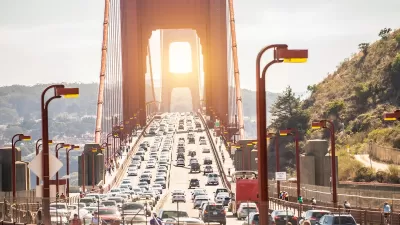New data show that in 2008 traffic congestion in the nation's cities declined by 30 percent, the result not of new roads or transit, but of modest declines in VMT.
The decline in congestion -- which analysts have labeled 'startling" -- was almost universal. Traffic congestion actually declined in 99 of the nation's 100 largest metro areas, according to Inrix, which monitors traffic around the nation. The company's data come from tens of billions of reports from GPS-equipped vehicles traveling the nation's roads, the same data that provides real-time traffic information to commercial users and web-services like Mapquest, Garmin and On-Star.
Their key conclusions: 'peak hour congestion on the major roads in urban America decreased nearly 30 percent in 2008 versus 2007,' and nationally, 'congestion was lower every hour of every day in 2008 versus 2007 – between 15 percent and 60 percent lower depending on the hour and day.' See the full report here.
How did such a small decline in travel produce such a big drop in congestion?"
FULL STORY: The Tipping Point

Planetizen Federal Action Tracker
A weekly monitor of how Trump’s orders and actions are impacting planners and planning in America.

Maui's Vacation Rental Debate Turns Ugly
Verbal attacks, misinformation campaigns and fistfights plague a high-stakes debate to convert thousands of vacation rentals into long-term housing.

San Francisco Suspends Traffic Calming Amidst Record Deaths
Citing “a challenging fiscal landscape,” the city will cease the program on the heels of 42 traffic deaths, including 24 pedestrians.

Amtrak Rolls Out New Orleans to Alabama “Mardi Gras” Train
The new service will operate morning and evening departures between Mobile and New Orleans.

The Subversive Car-Free Guide to Trump's Great American Road Trip
Car-free ways to access Chicagoland’s best tourist attractions.

San Antonio and Austin are Fusing Into one Massive Megaregion
The region spanning the two central Texas cities is growing fast, posing challenges for local infrastructure and water supplies.
Urban Design for Planners 1: Software Tools
This six-course series explores essential urban design concepts using open source software and equips planners with the tools they need to participate fully in the urban design process.
Planning for Universal Design
Learn the tools for implementing Universal Design in planning regulations.
Heyer Gruel & Associates PA
JM Goldson LLC
Custer County Colorado
City of Camden Redevelopment Agency
City of Astoria
Transportation Research & Education Center (TREC) at Portland State University
Jefferson Parish Government
Camden Redevelopment Agency
City of Claremont





























